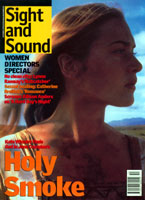Primary navigation

Italy/France 1957
Reviewed by Geoffrey Macnab
Our synopses give away the plot in full, including surprise twists.
Cabiria, a prostitute living on the outskirts of Rome, is thrown into the river by her lover Giorgio who runs off with her money. She nearly drowns, but is fished out by some local boys. Later, she witnesses a row between movie star Alberto Lazzari and his girlfriend. Lazzari whisks Cabiria off to a nightclub, then on to his apartment. When his girlfriend returns, Alberto hides Cabiria, eventually helping her slink out after the girlfriend falls asleep. Dumped in the wasteland on the edge of town, Cabiria meets a man giving out food to homeless people, among whom is the once-renowned prostitute La Bomba. Cabiria goes to church, but she is disillusioned by the shabby, market-like atmosphere. She visits a vaudeville club, where she is called up on stage by the hypnotist. Under hypnosis, she reveals her dreams of romantic love. The audience ridicules her. Outside the club, she meets Oscar, an accountant, who claims to have been moved by her honesty. She agrees to a date with him. They begin courting.
Eventually, Oscar offers to marry her. Radiantly happy, Cabiria sells up her house, withdraws her life savings and prepares to set up home with him. He leads her through the woods to a cliff top. She realises he intends to kill her. He spares her life but takes her savings. Distraught, she stumbles back to the road. Serenaded by a procession of young dancers and singers, she wipes away her tears and smiles. In spite of everything, her optimism has returned.
In an interview he gave to Charlotte Chandler, Fellini cited Chaplin's City Lights as a key influence on Nights of Cabiria. Instead of the little man in the bowler hat, he offers us a prostitute (played by his wife, Giulietta Massina) ekeing out an existence in scrubland on the edge of Rome. Screaming abuse at boyfriends, haranguing other women on the street, Cabiria is an infinitely more fiery character than Chaplin's tramp. "She's got nine lives, like a cat," someone observes after she is saved from drowning. She needs to be resilient, if only because she is constantly betrayed by menfolk.
At times, Nights of Cabiria seems like a picaresque folk tale. Nino Rota's playful music, Massina's live-wire, clownlike performance and the cruel humour which runs throughout the film suggest Fellini was no longer constrained by the tenets of neorealism. There are moments here - for instance the grotesque sequence in which the cripple is led into church in search of a miracle, attempts to walk unaided and promptly falls flat on his face - which wouldn't look out of place in a Buñuel film. The flights of fancy, such as Cabiria's evening with the handsome, world-weary movie star, anticipate equally magical and improbable happenings in the director's later work. Nevertheless, we're left in little doubt about the practical difficulties which beset Cabiria. She is a home owner, "with water, electricity, everything," but she knows that if she slips up, she may end living rough like La Bomba, the bedraggled ex-prostitute who now sleeps in a hole in the ground.
Their encounter comes when Cabiria accompanies a mysterious stranger who distributes food and blankets to the homeless. 'The man with the sack' sequence, as it is known, has been missing from most prints since the film showed in Cannes in 1957. There are different theories why. Biographer John Baxter suggests the church took exception to the fact that the benefactor was a layman, not a priest. But producer Dino De Laurentiis claimed the scene was cut simply to shorten the film. Whatever the reasons, the restored sequence seems pivotal. It's here that Cabiria is given an intimation of what may happen to her. The benefactor is also the only truly trustworthy man she meets in the entire film.
Massina plays Cabiria as an eternal optimist, almost cartoonishly picking herself up every time she's knocked down. She is nothing if not mercurial. One moment, she'll be happily dancing a mambo in the street; the next, having a catfight with a fellow prostitute who has taunted her about her latest no-good boyfriend. (It is striking how closely Massina resembles the equally close-cropped, equally volatile Shirley MacLaine, who played a character based on Cabiria in Sweet Charity, 1968.)
In outline, Nights of Cabiria sounds bleak and depressing. Unlike the young narrator of I Vitelloni (1953), who was finally able to escape his provincial home town, Cabiria has no way out. She's a Sisyphean figure, destined always to land back where she started. Given his acknowledged debt to Chaplin, Fellini might have been expected to play up the pathos in her plight. Cabiria's story is indeed heartrending, but neither director nor actress allow her time for self-pity. She may be robbed, betrayed and almost killed, but despair is never more than a passing emotion with her. Fellini ends the film ambiguously. Cabiria has lost her home. We don't know whether she'll suffer the same fate as La Bomba or pick herself up yet again. "I myself have worried about her fate ever since," the director confessed to Charlotte Chandler. Audiences are liable to leave the film feeling equally concerned.